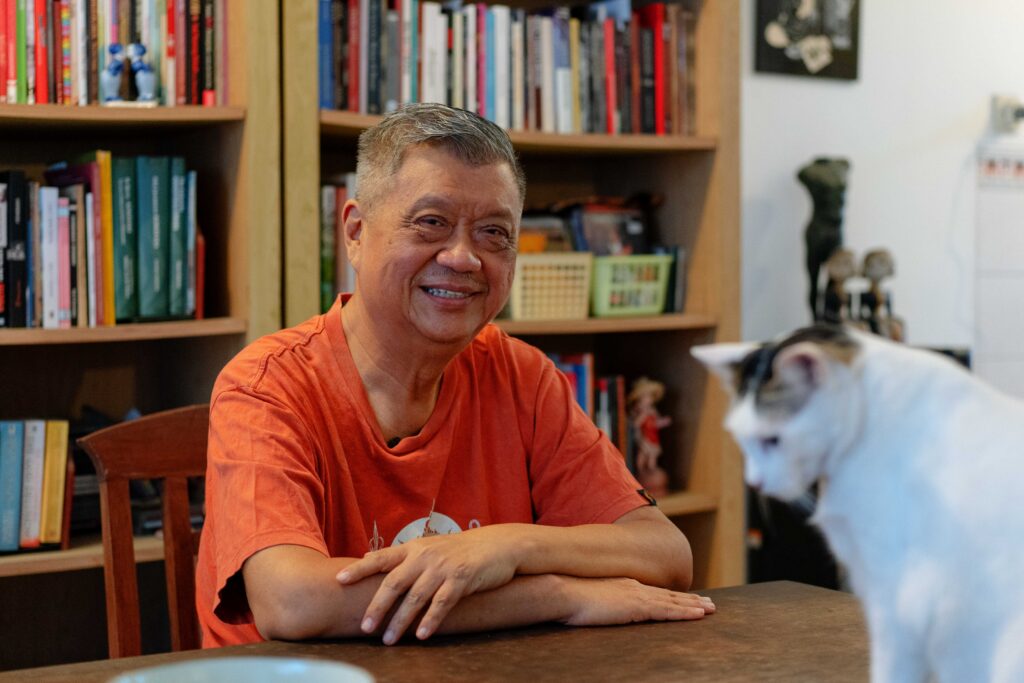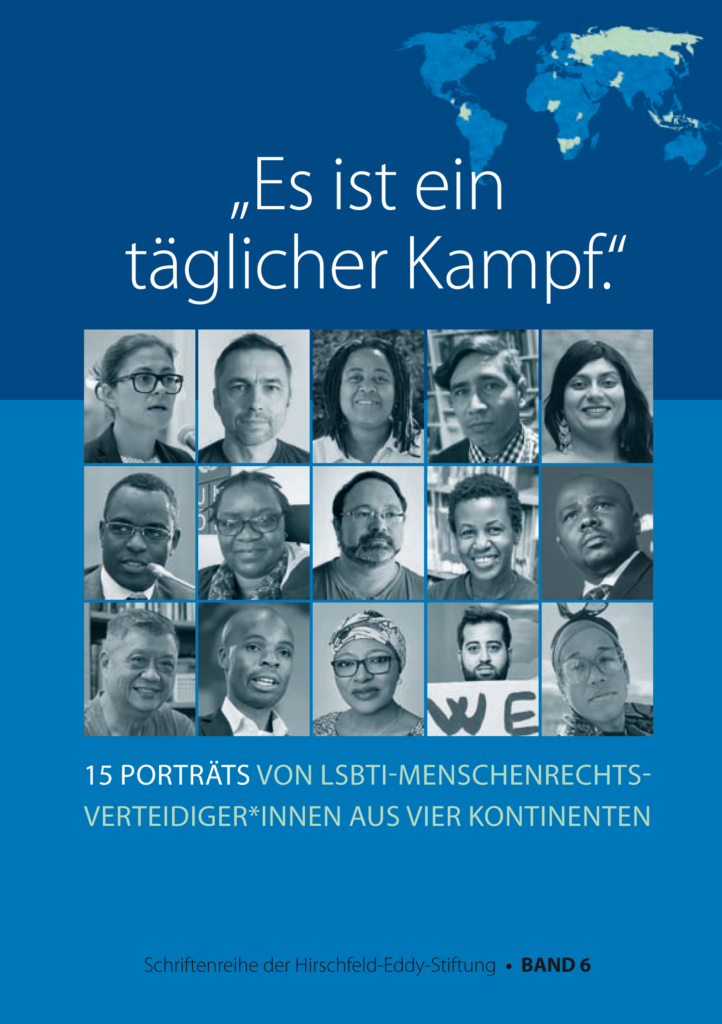Dédé Oetomo (68) is known as the godfather of the Indonesian LGBTIQ+ movement. He is a social scientist, AIDS activist, and role model for generations of young Indonesians. For his work as a human rights activist, Oetomo was honoured back in 1998 by the International Gay and Lesbian Human Rights Commission (today’s OutRight Action International).
Translated from Hirschfeld Eddy Foundation series volume 6 “15 Portraits of LGBTIQ+ human rights defenders” (2021): download or order free of charge (in German) here.
“For days I was ecstatic, and felt as though I was levitating,” says Dédé Oetomo in describing his second coming out. It was the most joyful experience of his life, which he remembers fondly to this day. “When I came out for the second time to my father, he just asked me if I was sure. Then he told me not to tell other people. But I had already told everyone I knew.” Oetomo beams, the effect accentuated by his smile lines and dark eyes.
Oetomo came out for the second time in December of 1979 at the age of 26. Five years earlier he had told his closest friends he was gay. He had also informed his parents although they were shocked and saddened at the time, and wanted to see their son “healed”. So Oetomo and his father drove to Indonesia’s capital Jakarta, around 800 kilometres from their home city of Surabaya in East Java. The trip was his own idea, but he needed money from his parents for accommodation. A psychologist had referred him to hormonal testing in the capital, which showed him to be male. But the main result of these efforts came from therapy sessions with the referring psychologist, which consisted of assigned readings on sexuality. “The books eventually convinced me that there was nothing wrong with me.”
For nearly 15 years he had been ashamed of his sexuality and sought to resist it. As a pupil at Catholic schools, he had prayed to be healed and later hoped for something similar from medical professionals. At the age of 11 he learned the word “homosexual” from a popular magazine subscribed to by his parents. Around the same time he had his first wet dream. “It was with the nephew of one of my mother’s seamstresses. I hugged him and ejaculated – which woke me up. “I realized I was different, and was rather worried.”
From outsider to trailblazer
Oetomo, who is now 68, has been something of an outsider his entire life. He was born in 1953 to a Chinese-Indonesian family in Pasuruan, a cosmopolitan city in East Java known for its sugar refineries. That was just four years after Indonesia’s independence from the Netherlands, and a turbulent time in the country’s history. In 1965 Oetomo’s youth changed when General Suharto, a bitter foe of communism, came to power. His government associated the Chinese with communists, and banned Chinese language instruction and cultural expression for three decades. Oetomo was harassed and discriminated against during this time because of his Chinese roots.
With a multicultural background and a talent for languages, Oetomo studied English language teaching, and then began postgraduate work in linguistics and Southeast Asian studies. In 1978 he was accepted at Cornell University in New York. Six years later he received his doctorate there, describing it as one of the most important experiences of his life. The time in the USA not only shaped his intellectual interests but also helped him come out and live his sexuality. “I decided to stop acting like I was heterosexual and began immersing myself in a homosexual milieu.” That meant devouring books about homosexuality, attending meetings and discussions, and joining the gay group on campus. He published a number of personal essays anonymously in Indonesian magazines, in which he expressed pride in his sexuality.
“In the USA I realized we should form organizations,” he says, and proceeded to found Indonesia’s first gay rights organization in 1982. In 1987 he launched a new one called GAYa Nusantara (gayanusantara.or.id). The main aim of this organization is to make Indonesia a just society in which all people can live freely and equally before the law. It publishes a monthly magazine, offers workshops on human rights, AIDS prevention, gender identity and sexuality, and advises and supports LGBTIQ+ people. Its members often gather at Oetomo’s home in the city of Surabaya in East Java.
Over the years the Indonesian government reluctantly came to tolerate Oetomo’s activism. In 1999, when the country transitioned to democracy, Oetomo became a candidate for a small left-wing party. It was the first of many times he campaigned for a seat in parliament or other public offices. Not surprisingly, he lost every time. Andreas Harsono, an expert on Indonesia at Human Rights Watch and a long-time friend of Oetomo, told the New York Times: “In Indonesia three things are considered political suicide: being communist, being Chinese, and being gay. Dédé is at least two and a half of them.” But his campaigns made him the country’s best-known advocate for homosexual rights.
Aims and desires
Over the past approximately 20 years, Indonesia has seen a change toward stigma and discrimination, especially for transgender and gender non-conforming persons, and to a lesser degree for LGB persons. Conservative politicians are proposing “anti-LGBTIQ+ propaganda” legislation, and “homosexual acts” are still punishable by law in a few conservative parts of the country. It might therefore appear that Oetomo’s life work for homosexual rights is being eroded. “Although the constitution prohibits discrimination on the basis of ‘anything’ on paper, this is not translated into lower-order legislation,” he explains. “One policeman is currently challenging his dismissal on the basis of his homosexuality in the administrative courts.”
Indonesian law only recognizes two genders. LGBTIQ+ organizations have to operate discreetly, and it is not possible to hold public events. “The police do not protect us against threats from intolerant groups,” he says. “Another challenge is ignorance or persecution by most government institutions, forcing many of our organizations to go underground.” However, there are LGBTIQ+ groups in nearly all the country’s 34 provinces, often under other names. Many operate chiefly on social media. Oetomo therefore would like donor countries and NGOs to provide “discreet assistance in securing safety for communities and organizations and aid for projects,” because it is almost impossible to exert diplomatic pressure in this area on the Indonesian government. “We work intersectionally with human rights and legal aid organizations, and have allies in many countries, different sectors, and intercultural and faith-based organizations,” he says.
Despite the adverse circumstances Oetomo does not despair. The very important task of balancing progressive democratic values with conservative religious views is simply part of the struggle in a young democracy, he says. The goal is “to build a life in which we can be ourselves, however different we are, at the individual and family levels, without negative consequences.” For Indonesia, he therefore wants “a new generation of leaders who understand and dare to defend minorities.” That generation is already in the wings. Lini Zurlia, a 27-year-old LGBTIQ+ activist from Jakarta, affectionately calls Oetomo “Oma” – which means “grandmother” in Dutch. Other young activists call him that too. As Zurlia told the New York Times, her generation’s challenge is to pick up where he left off. “What Dédé accomplished, what Dédé struggled for, that’s what we have to carry on.”
Christina Weise
Links:
- A Happy Warrior in a Faltering Battle for Indonesian Gay Rights, Dede Oetomo is widely considered the godfather of Indonesia’s gay rights movement, The New York Times
15 Portraits of LGBTIQ+ Human Rights Defenders:
| Cesnabmihilo Dorothy Nuhu Aken’Owa Nigeria | Mauri Balanta Jaramillo Colombia | Ali Bousselmi Tunisia |
| Tash Dowell Zimbabwe | Irene Garoës Namibia | Jean Elie Gasana Rwanda |
| Julius Kaggwa Uganda | José Ignacio López Nicaragua | Andriy Maymulakhin Ukraine |
| Frank Mugisha Uganda | Dédé Oetomo Indonesia | Lilith Raza Pakistan/ Germany |
| Monica Tabengwa Botswana | Dragana Todorovic Serbia | Mikhail Tumasov Russia |
An event by Hirschfeld Eddy Foundation as part of the project: LGBTIQ+ Human Rights Defenders. Find all articles relating to this project in our Blog here and via the Tag MRV-2021.




